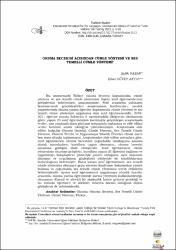| dc.contributor.author | Yaşar, Şefik | |
| dc.contributor.author | Aktay, Güvey Emel | |
| dc.date.accessioned | 2019-10-19T19:57:23Z | |
| dc.date.available | 2019-10-19T19:57:23Z | |
| dc.date.issued | 2015 | |
| dc.identifier.issn | 1308-2140 | |
| dc.identifier.uri | http://www.trdizin.gov.tr/publication/paper/detail/TWpVME56YzJOZz09 | |
| dc.identifier.uri | https://hdl.handle.net/11421/15237 | |
| dc.description.abstract | Bu araştırmada Türkçe okuma becerisi kapsamında, cümle yöntemi ve ses temelli cümle yöntemine ilişkin sınıf öğretmenlerinin görüşlerinin belirlenmesi amaçlanmıştır. Nitel araştırma yaklaşımı benimsenerek gerçekleştirilen araştırmanın katılımcıları, meslek yaşamlarında okuma yazma öğretimi kapsamında cümle yöntemi ve ses temelli cümle yöntemini uygulamış olan sınıf öğretmenleridir. 20102011 öğretim yılında Eskişehir il merkezindeki ilköğretim okullarında görev yapan 20 sınıf öğretmeninin katılımıyla gerçekleşen araştırmada veriler, yarı yapılandırılmış görüşme sorularıyla toplanmış ve elde edilen veriler betimsel analiz tekniğiyle çözümlenmiştir. Araştırmada elde edilen bulgular Okuma Becerisi, Cümle Yöntemi, Ses Temelli Cümle Yöntemi, Yöntem Tercihi ve Uygulamaya Yönelik Öneriler olmak üzere beş tema altında toplanmıştır. Araştırmadan elde edilen sonuçlara göre; sınıf öğretmenleri okuma becerisini çoğunlukla okuduğunu anlama olarak tanımlarken; kurallara uygun okumanın, okuma becerisi anlamına geldiğini ifade etmişlerdir. Sınıf öğretmenleri cümle yönteminin okumayı geliştirici, kurallara uygun dil öğrenimi sağlayıcı ve uygulamayı kolaylaştırıcı yönleriyle yararlı olduğunu; aynı zamanda okumayı ve uygulamayı güçleştirici yönleriyle de sınırlılıklarının bulunduğunu belirtmiştir. Buna karşın sınıf öğretmenleri, ses temelli cümle yöntemini okumaya geçiş süresini kısaltması bakımından yararlı bulmuş ve çoğunlukla ses temelli cümle yöntemini tercih ettiklerini belirtmişlerdir. Ayrıca sınıf öğretmenleri uygulamaya yönelik öneriler arasında; okuma yazma öğretiminde karma yöntemin kullanılabileceği, okumanın düzenli ve sürekli bir alışkanlık haline gelmesi gerektiği ve bu konuda öğretmen ve ailelerin rolünün önemli olduğuna ilişkin görüşlerini de belirtmişlerdir | en_US |
| dc.description.abstract | Early reading and writing which occupies an important place in socialization and self-expression of individuals is not a skill which is to learn only at a school but something which must be improved throughout life. Improvement of teaching early reading and writing is essential for early reading and writing, which is the base of the activities enabling individuals to increase their socialization and academic success, to conduct effectively. The efforts for improvement of teaching early reading and writing have accompanied the use of various methods and techniques in teaching and learning process. Although they are named differently, basically, two classifications are attained Vacca (1996) considers teaching early reading and writing “phonics” and “whole language”; and addresses the comparisons made between them. These approaches and methods that were focused on in the late 1980s and beginning of 1990s are no longer up to date information. Most of the teachers who saw themselves as supporters of whole language approach have been using phonics-first approach as well. These are two different theoretical approaches. One of them is based on behaviorist theory, another is based on constructivist theory (Andrew, 2015). The methods of teaching early reading and writing in Turkey are classified as “synthesis methods”, “analysis methods” and “blended methods” (Güneş, 2005). These classified methods and techniques have been conducted in teaching early reading and writing and curriculum in Turkey in different terms. The early reading and writing teaching which was conducted starting from simple words in 1936 was performed by adopting clause method in the Turkish Curriculum of 1948 (Çelenk, Tertemiz & Kalaycı, 2000). The adoption of the clause method continued in the curriculums of 1968 and 1982 (Güleryüz, 2002). After the Turkish Curriculum of 1982, the Turkish Curriculum of 2004-2005 was introduced not only in order to bring individuals in early reading and writing but also improve such mental abilities as thinking, understanding, ordering, questioning, classifying, relating, analyzing-synthesizing and evaluating (Güneş, 2005). In this context, with the purpose of raising individuals who learn the learning process itself and are able to use knowledge, early reading and writing teaching has been addressed and sound based clause method has been adopted in teaching process (Turkish Teaching Curriculum in Primary Education, 2006). In the sound based clause method, early reading and writing teaching starts with sounds. After giving the sounds which constitute a meaningful whole, words and clauses are reached (Şahin, 2009, s.127). In the clause method, clause is the natural thought unit in real terms. Teaching phases through clause method include analysis of the clause Okuma Becerisi Açısından Cümle Yöntemi ve Ses Temelli Cümle Yöntemi 3 Turkish Studies International Periodical For the Languages, Literature and History of Turkish or Turkic Volume 10/7 Spring 2015 by child by subdividing a clause into words, words into syllables then syllables into letters (Çelenk, 2002). This study has been conducted on the basis of the fact that the clause and sound based clause method may affect reading skill in early reading and writing teaching process and teachers can observe these interactions more clearly. It is expected that the study will help teachers in practice and contribute the literature with regards to approaching the methods used in early reading and writing teaching within the scope of Turkish language. | en_US |
| dc.language.iso | tur | en_US |
| dc.rights | info:eu-repo/semantics/openAccess | en_US |
| dc.subject | Sosyal Bilimler | en_US |
| dc.subject | Disiplinler Arası | en_US |
| dc.title | Okuma Becerisi Açısından Cümle Yöntemi ve Ses | en_US |
| dc.title.alternative | Clause Method and Sound Based Clause Method Related to Reading Skills | en_US |
| dc.type | article | en_US |
| dc.relation.journal | Turkish Studies (Elektronik) | en_US |
| dc.contributor.department | Anadolu Üniversitesi, Eğitim Fakültesi, Temel Eğitim Bölümü | en_US |
| dc.identifier.volume | 10 | en_US |
| dc.identifier.issue | 7 | en_US |
| dc.identifier.startpage | 1 | en_US |
| dc.identifier.endpage | 18 | en_US |
| dc.relation.publicationcategory | Makale - Ulusal Hakemli Dergi - Kurum Öğretim Elemanı | en_US] |


















